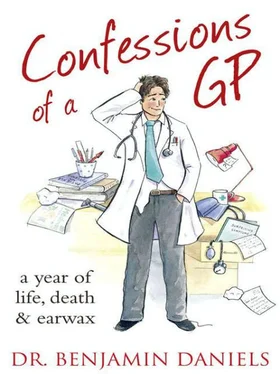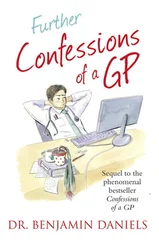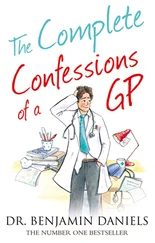I also found myself feeling very judgemental during a child protection case conference. I was in a meeting with social workers, health visitors and other professionals discussing what should be done with an unborn baby belonging to one of my patients. I knew the mum-to-be well and, quite frankly, I thought she would make an absolutely terrible mother. She was rude, aggressive and always in trouble with the police. The dad wasn’t on the scene and her own family had disowned her. I just didn’t believe that she was the right person to give that baby the best start in life. Everyone in the meeting was very professional and positive. They were looking to implement extra support for the mum to help her with her new baby. I tried to be positive, too, and I do think kids are best off with their real parents, but a big part of me wanted to take that baby away at birth. I wanted to give him to the nice couple who kept failing with the IVF. I just felt that the child would have a better future with them than with its real mother.
Deep down I knew that I had no right to pass judgement on who would make better parents. I see my patients for ten minutes at a time and don’t have the right to decide if someone should have their child taken away. What do I really know about parenting anyway? Would I like someone passing judgement on what sort of dad I am? Back at the case conference we all agreed that once born, the baby would be put on to the child protection register but stay with the mum and be closely monitored. I hoped I’d be proved wrong and that the new mum would do a great job. I know it is not my place to judge my patients but it can be very difficult sometimes.
There is a lot of drama in medicine. As a doctor much of what I do is a performance rather than an attempt to actually gain important medical information. The examination is perhaps the most evident example of this. Examining patients is obviously important and sometimes I even find something abnormal…But a lot of the time the examination is a bit of a fraud. It is all part of my attempt to add mystique and importance to my job.
An example of this is when I visit one of my patients called Mr Briggs. Mr Briggs is well into his nineties and very frail. He has lots of things wrong with him, but unfortunately, they are mostly because of his excessive years and there isn’t a great deal I can do about them. I’m fairly certain that Mr Briggs is going to die within the next year and my main objective is to make sure he remains as comfortable as possible and that I provide reassurance and support for him and his wife. Whenever I visit Mr Briggs, I check his blood pressure. I check it every visit and it doesn’t change much. Even if it was raised, Mr Briggs has already said he doesn’t want to start any new medication and certainly doesn’t want to have any tests or investigations if he becomes more unwell.
Ultimately, I am not examining Mr Briggs for his physical health but for his emotional health. He is expecting me to examine him and by going through the motions, I am offering reassurance. Human-to-human contact is comforting. I am English so I don’t give Mr Briggs a hug. Instead, I use a blood pressure cuff and a stethoscope to reach out and make some soothing physical contact with this dying man. ‘Strong as an ox,’ I often say after listening to his heart. It sounds patronising written here but I know that Mr and Mrs Briggs are reassured by my words. ‘I wish the rest of my body was as strong as an ox,’ Mr Briggs will reply as I shake his hand on leaving. Sometimes I wonder whether my examinations of Mr Briggs are actually as much for my benefit as for his. If I didn’t have the extra gimmick of my stethoscope and blood pressure machine, how could I justify my visits? They are the instruments that define me as a doctor and without them I could simply be a visiting neighbour or the local vicar.
I am clearly not the only doctor who sometimes uses the examination as a bit of a show. One of my colleagues was visiting an elderly patient to give him a check-over and to reassure his wife. He had already mentioned that he would have a listen to his chest but then found that he had left his stethoscope at the surgery. Not wanting to admit this, he instead took out a 2p coin from his pocket and carefully placed it at various points on the patient’s back. He was using the coin to mimic the bell of his stethoscope and as the patient was facing the other way, he imagined he would be none the wiser. Apparently, the patient seemed happy enough but just as my colleague was on his way out he stopped him: ‘Just one thing, Doctor. I’ve seen some things in my time but I’ve never seen a doctor listen to my chest with a 2p coin.’ The doctor hadn’t noticed the mirror on the dresser that enabled the patient to watch him examining him. My colleague came clean and apparently they had a bit of a laugh about it. Just a lesson for us all not to ever try to pull the wool over our patients’ eyes!
An astounding part of being a doctor is that a complete stranger can walk into my consulting room and within two minutes I can be asking them about their deepest, darkest sexual habits. A full sexual history is vital for accurately diagnosing and treating many illnesses. It is also a great way to find out exactly what people get up to behind closed doors! I am still amazed by my patients’ sexual escapades and also about how honest, open and unembarrassed they are when telling me all about them. My patients make me feel very boring as they recall tales of dogging, rimming, fisting and various other sexual behaviours that I have to Google in order to know what they are talking about.
The youth in my area seem to be amazingly promiscuous and I was astonished when I met a patient who had kept her virginity until she got married at 23 years old. Her husband had apparently done the same and they had been using condoms for a couple of years until the previous month when they had decided to start trying for a baby. Jane, the woman in question, came to see me complaining of a creamy white vaginal discharge that she was now getting after sex. I feared the worst. I was sure her husband must have been having an affair and that she had caught some kind of sexually transmitted infection. I ordered a full set of vaginal swabs but everything came back as normal. It was only when she returned to see me and I asked her to explain her discharge symptoms in a little more detail that I realised that the post-coital discharge she was describing was actually just her husband’s semen.
Do GPs earn too much? That has certainly been the general consensus of the media over the last few years. I personally don’t know any GPs who earn £250K as reported by the press; however, most GP partners who work full time earn over £100K, which seems a lot of money to me. I am not a partner myself but do fairly well out of being a locum GP and just a few years ago I was working considerably more hours as a hospital doctor for less than half the money.
The reason GPs earn so much is mainly political. I appreciate that many of you will be fairly uninterested in this and have brought the book to hear some amusing stories about patients coming in with unusual objects stuck up their bum, etc. If this is you, please skip to the next chapter.
In defence of our high earning:
• We are highly trained – on average, it takes about 10–12 years to become a GP from starting medical school.
• We have a stressful and difficult job.
• We work hard. Most GPs work long days with lots of evening meetings and commitments.
• We have a high tendency to be sued and pay £5,000 per year on our defence union fees.
Читать дальше
Конец ознакомительного отрывка
Купить книгу











![Benjamin Franklin - Memoirs of Benjamin Franklin; Written by Himself. [Vol. 2 of 2]](/books/747975/benjamin-franklin-memoirs-of-benjamin-franklin-wr-thumb.webp)
![Benjamin Franklin - Memoirs of Benjamin Franklin; Written by Himself. [Vol. 1 of 2]](/books/748053/benjamin-franklin-memoirs-of-benjamin-franklin-wr-thumb.webp)